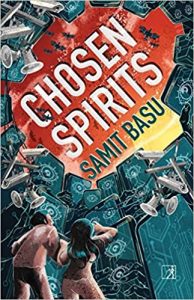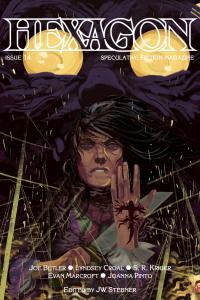Ian Mond Reviews Chosen Spirits by Samit Basu
 Chosen Spirits, Samit Basu (Simon & Schuster India 978-9386797810, ₹499.00, 243pp, hc) April 2020. (Self-published, $3.99, eb) April 2020.
Chosen Spirits, Samit Basu (Simon & Schuster India 978-9386797810, ₹499.00, 243pp, hc) April 2020. (Self-published, $3.99, eb) April 2020.
Samit Basu’s Chosen Spirits presents us with a near-future India where drones saturate the sky, where every room has a listening device, and where those who speak out tend to disappear. It wasn’t meant to be like this. When she was young, our protagonist Bijoyini “Joey” Roy, recalls attending demonstrations with her parents and looking up to the student leaders and activists, “the children of blood and fire,” who fought “to save the country, the Constitution, the unity that India was founded with,” against a phalanx of thugs with batons and armed police. But this uprising against totalitarianism fails, and those who led the protests are either imprisoned or forced to flee the country. A decade later and India is as divisive as ever, a country fraught with systemic racism and exclusion, governed by oligarchs and Chinese investment.
Now in her mid-20s, Joey lives in fear that her parents, still bitter about the “Years Not To Be Discussed,” will be bundled up in a van, never to be seen again. When she’s not failing to make her father “understand that his new toothbrush heard every word he said,” Joey works as a Reality Controller for the “Flow” – a cyber-punkish, hyped-up version of social media, the primary source of news and information for anyone under the age of thirty. In her role, she manages Flow-verse star and ex-boyfriend Indrajith “Indi” Mathew; auditioning girlfriends so he can shill a smart tattoo, strategising how best to increase his profile, and managing the expectation of Indi’s “Flowco” investors. We are never left in any doubt that Joey is damn good at her job. Still, we experience her guilt, her frustration, as she actively looks away at the oppression around her “because not looking away means seeing terrible things.”
The plot kicks into gear with the introduction of Rudra Gupta. Estranged from his obscenely wealthy family for five years, he has returned to attend his father’s funeral. Initially treated like a stranger (when we first meet Rudra he’s struggling to prove his identity to the guards patrolling his parents compound) his brother, now in charge of their father’s “ethically dubious luxury body-modding ‘wellness’ clinics” asks Rudra to rejoin the family business. This means working alongside the shadiest of shady powerbrokers to aid in the roll-out of a slavery app. Cue Joey. She is also attending the funeral. Her and Rudra’s parents were once close until money and power put a wedge between them. When she spies her childhood friend weighing up a life as a slave trader, Joey steps in and offers him a role as her assistant. It’s a bold move on her part, an act of defiance against those in power, a decision that will have steep repercussions.
In the Acknowledgements, Basu tells us that Chosen Spirits “is not set in a dystopia, but is a best-case scenario.” It’s a sobering statement, given the novel features all the trappings of a traditional dystopia: the violent suppression of free speech, the manipulation of the media and the vast gulf between the rich and poor. This, though, is coming from a narrow Western perspective. If you compare the India of Chosen Spirits with the India of today, an India increasingly shaped by the racist and authoritarian policies of Narendra Modi, an India where the press is no longer free, an India where a Facebook post critiquing the BJP can ruin your life, you begin to appreciate why Basu would describe his portrayal as a “best-case scenario.” Chosen Spirits, therefore, isn’t a cautionary tale (like most dystopian fiction) but an attempt to grapple with an inevitable future. Although the book, toward the latter part, does consider the possibility for change, Basu’s main focus is to dig into the mechanics of oppression, the way those in control silence or marginalise the “other” – whether it be Muslim, Dalit or LGBTQIA+ voices – by feeding an eager audience with spectacle and distraction. There’s this fascinating discussion between Indi, Joey, and a potential investor, about what it means to be an “influencer,” to garner an audience both in India and in the West, a lengthy, cynical discourse that gets into the nature of power, of propaganda, of people’s tendency to vote against their interests. It’s deep-dives like this that make the book such as a fascinating read. Having said that, if Chosen Spirits does stumble it’s that Basu is a little too eager to cover all forms of persecution, including a #metoo subplot that feels tacked on. I sympathise with the view that core science fiction, post-2016, has not done enough to interrogate the current moment. Obviously, there are exceptions like Tim Maughan’s Infinite Detail, Anne Charnock’s Bridge 108, and James Bradley’s Ghost Species (and I’m sure Kim Stanley Robinson’s The Ministry for the Future though I haven’t read it). But even these works are limited to a singular Western perspective. It infuriates me, then, that a novel as passionate, as angry and a smart as Chosen Spirits has not been published outside of India. We need more books like this, books that speak to the experiences of people living in other parts of the world, books that rail, through the prism of science fiction, against populism, racism and oppression, books that confirm that the problems we face are global, not local.
This review and more like it in the August 2020 issue of Locus.
 While you are here, please take a moment to support Locus with a one-time or recurring donation. We rely on reader donations to keep the magazine and site going, and would like to keep the site paywall free, but WE NEED YOUR FINANCIAL SUPPORT to continue quality coverage of the science fiction and fantasy field.
While you are here, please take a moment to support Locus with a one-time or recurring donation. We rely on reader donations to keep the magazine and site going, and would like to keep the site paywall free, but WE NEED YOUR FINANCIAL SUPPORT to continue quality coverage of the science fiction and fantasy field.






